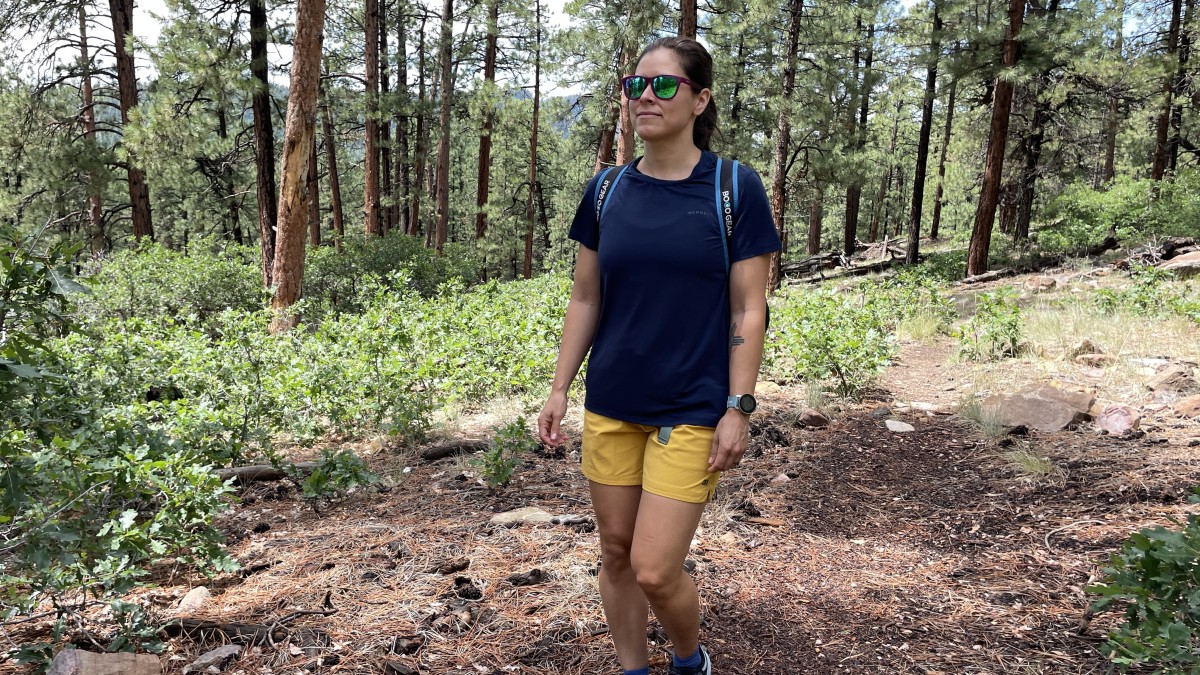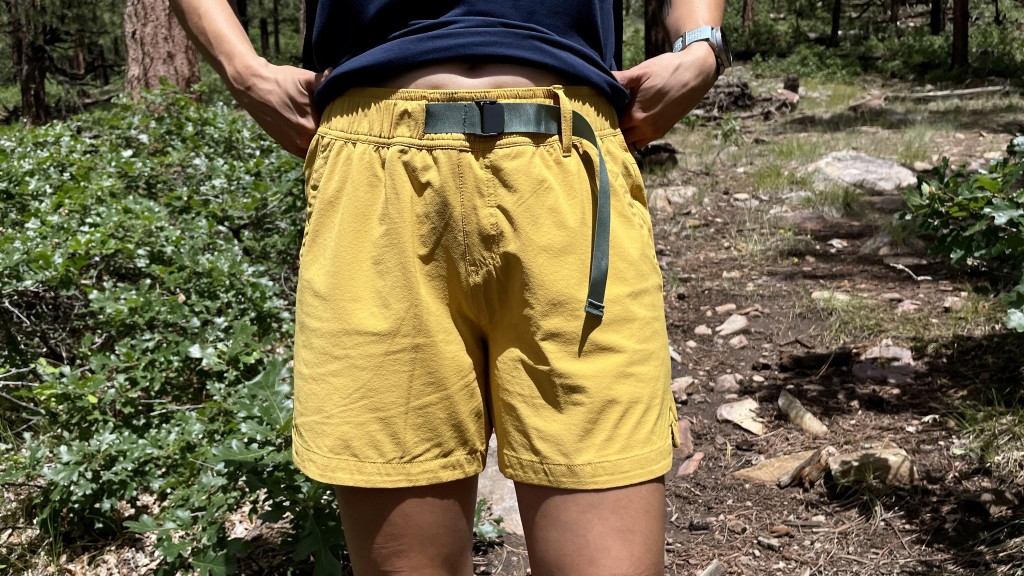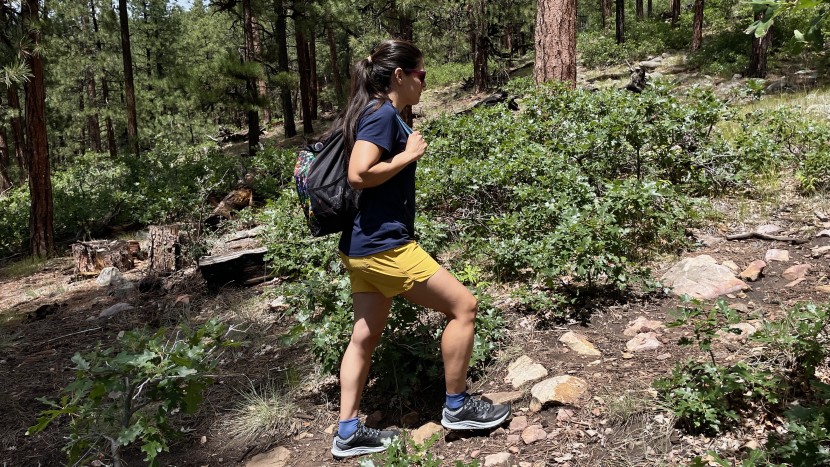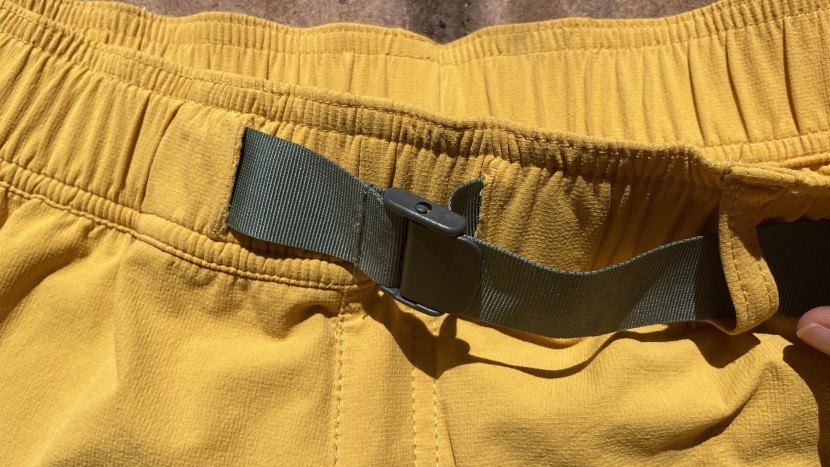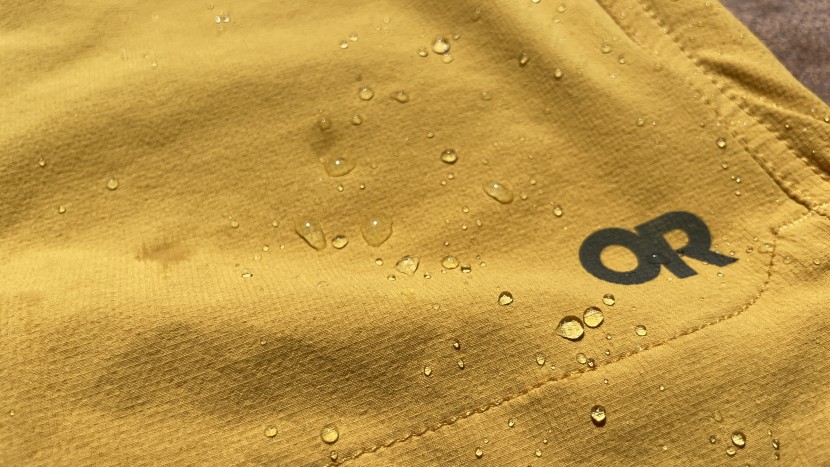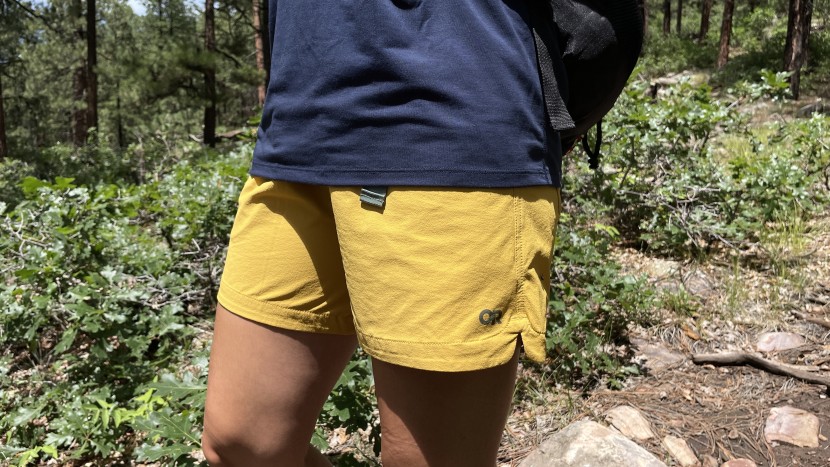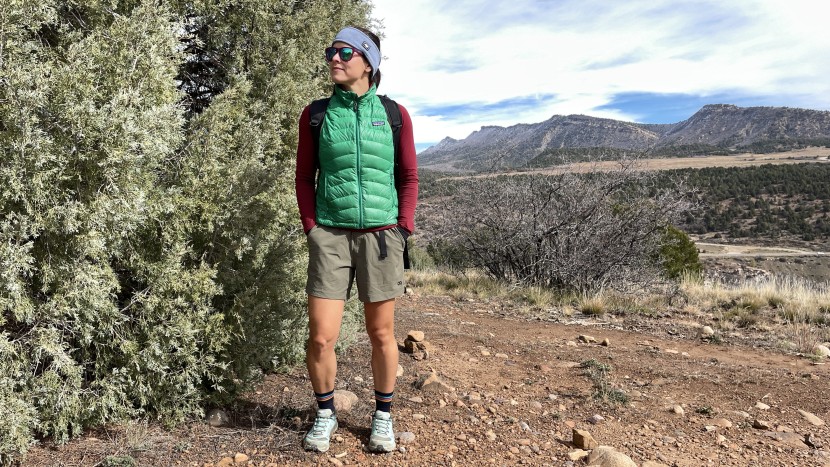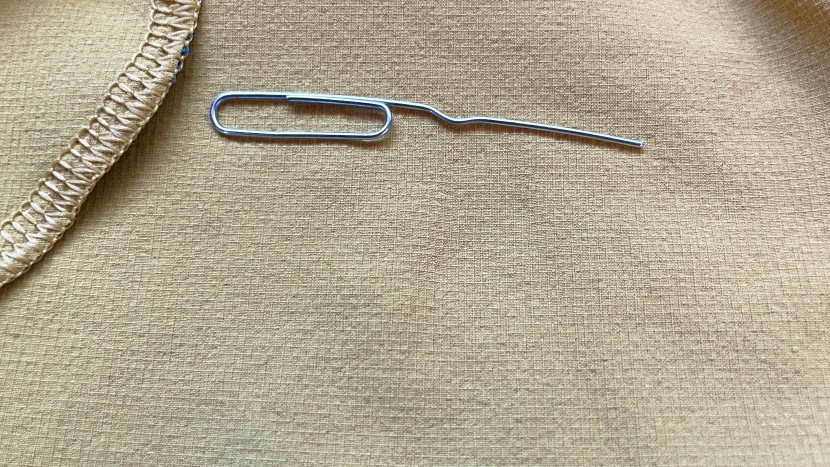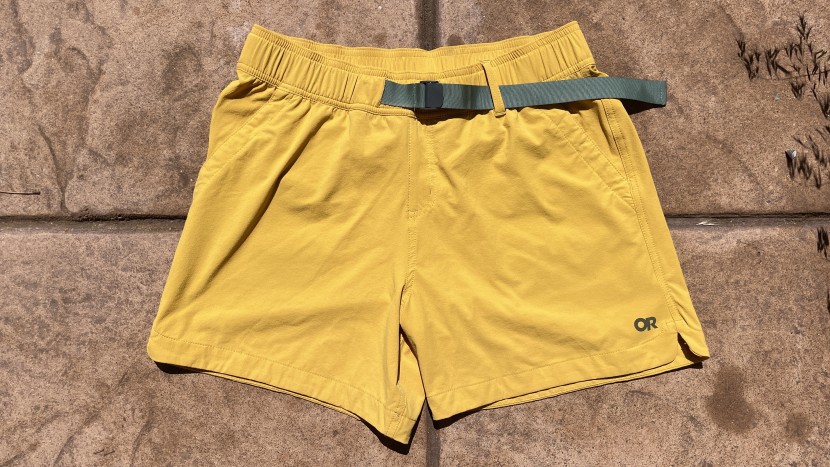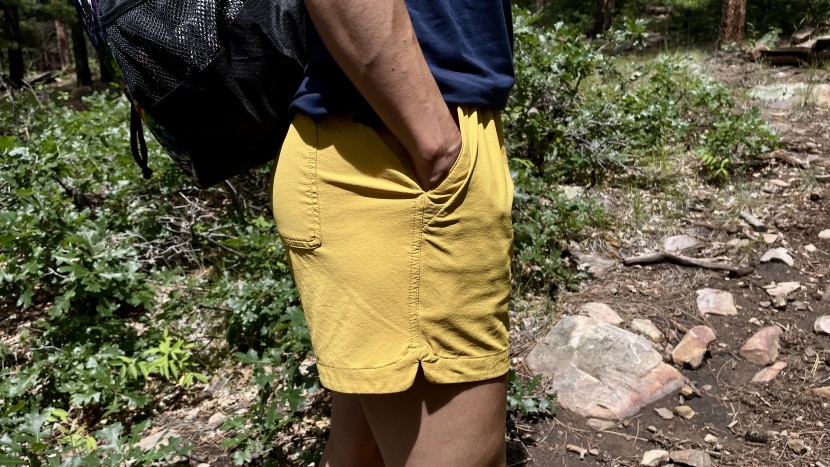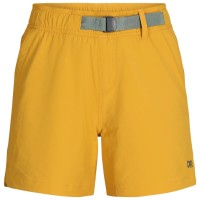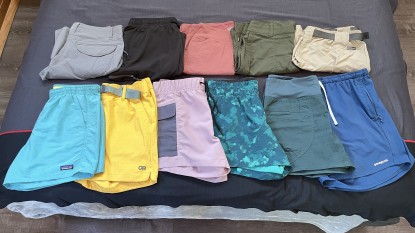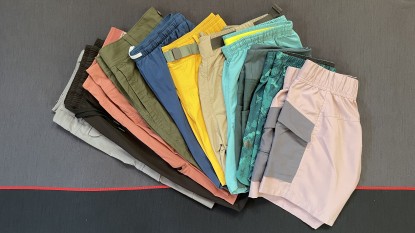
Our Verdict
Our Analysis and Test Results
Constructed with a mix of 86% Nylon (of which 46% is recycled) and 14% spandex, the bluesign-approved fabric on the Outdoor Research Ferrosi Shorts offers a nice blend of stretch and durability and the confidence that strict environmental and safety protocols have been adhered to in the manufacturing process. This model is designed in a pull-on style, meaning it has no other means of closure at the waist, such as zippers or buttons. Instead, you'll find an integrated belt system mostly hidden by a wrapped elastic waistband, making it easy to slip these on and dial in the fit. The design comes with four extra deep pockets — a welcome attribute for many hikers who want their phones, Chapstick, or keys close at hand. And weighing in at 7.2 ounces and with a 5-inch inseam, they are lightweight but not necessarily ultralight, so you get all the benefits of a sturdy, high-waisted, mid-length design, plus a comfy, easy-to-move and carry fit without adding any unnecessary bulk.
Overall, comfort and mobility were impressive comparatively, even if a few other models still outperformed in this metric. Also, the drying time and stitching densities on the Ferrosi Shorts were among the least impressive of the group. Yet, the final package still comes in with a reasonably high score overall, given a better performance in other metrics. As you'll read below, high-waisted shorts are notorious for being less comfortable than other waistband designs.
Comfort and Mobility
The fabric itself is fairly smooth to the touch and feels good against the skin. Despite having an elastic waistband, which can sometimes create discomfort over lengthy days of use, these shorts performed above average in comfort for all-day wear. We credit the slightly wider dimensions of the waistband in the shorts for that responsive fit, as it helps to disperse pressure while maintaining fit. Plus, the elasticity itself isn't as snug as other models can be. This is where the belt comes in, and it is actually very useful. We love how easy and quick it is to engage the lock once we've cinched the belt to our comfort level. Undoing the lock is also an easy flick of the plastic press, allowing us to remove the shorts for bathroom breaks quickly. Because of this innovative belt design, we feel the OR Ferrosi shorts stand out for these adaptations. Comfort isn't easy to nail with high-waist designs, so we applaud this pair for their thoughtfulness.
The stretch in the shorts allowed our testers to move unencumbered when tackling high steps or moving quickly at stride. Pockets were easily accessible and proved comfy in motion as well, even when stowing larger items like a phone. It's always a breath of fresh air when hiking shorts incorporate pockets that are actually deep and hold the items we're likely to need for our days out. We will note, however, that it proves easier to carry a phone in the front pockets than in the back ones. So, you will likely end up toying with the positions you place things in to ensure the right fit and access once you hit the trail. In summary, comfort and mobility are excellent for a belted design but may not out-compete the weighted results we saw in knit waistband models. As for sizing, we do feel that this model runs a bit small, especially when compared to other brands. Make sure to try on various sizes to ensure the best fit.
Fabric Performance
Two of the primary evaluations that feed into this metric score are the results of our soaking and drying time tests, as well as our experience in use testing these same characteristics. The manufacturer doesn't state outright that the fabric has any water-resistant treatment, but we can report that they do from our observations in testing, as water does bead on top when splashed. For the soaking test, it took around 2.5 minutes for the fabric to become completely saturated, which was notably among the slowest times we recorded across our lineup. But it then took another 56 minutes to air dry these shorts, which was also among the lowest we saw.
This can be interpreted in a couple of different ways. In the heat of summer, it's nice to splash or even soak clothing and hats to cool down, and the longer the fabric stays wet, the better it helps to cool you in this context. But at the same time, no one wants to arrive back to the car and still be sopping wet. Similarly, if a rainstorm surprises us and we get caught looking for cover, it can become uncomfortable if we do not begin to dry quickly. And if you are like most of us and you tend to sweat when covering miles, it can also become uncomfortable to have shorts that don't shed that excess moisture - it can even cause chafing. So there are pros and cons to this same result. A drying time of 56 minutes isn't beyond the realm of practicality in our minds, especially given our test space was indoors and featured no direct sunlight (to ensure a repeatable, controlled environment for testing across all products, but notably not favorable conditions for faster drying results). On a warm day outside, when confronted with a breeze and direct sunlight, this Outdoor Research fabric is likely to dry much faster. So, you may not find the balance of slower soaking time and slower drying times works just fine for you once you are in motion.
The two front pockets have mesh lining, which aids in ventilation. We measured the leg opening circumference to be 25.5 inches, which is on the wider side. This provides more airflow and helps with breathability. The fabric also has a UPF rating of 50+, which means sun protection is high enough to diminish UV radiation penetration dramatically. Overall, given its high-tech and lightweight nature, the fabric does well, but it receives a slight reduction in total score due to its slower drying time.
Versatility and Style
A great choice for easy, moderate, and highly technical hikes, we think the versatility is not only perfect for days on the trail but could also be a worthy choice for other outdoor activities. Having an integrated belt increases comfort beneath a backpack waist belt because it produces less bulk. Bike commuting, easy stretching, and scrambling are all doable in this pair. Even light jogging isn't out of the question. When it comes to style, we know that people will either love the light, high-waisted, belted design or swipe away. And we suspect that decision may really depend on how you feel about a belt itself. Our lead tester admits she isn't a belt person, but she did find this pair to be appealing regardless.
The colorway options are a mix and include fun and bright options in addition to more earthy, neutral choices. The integrated belt actually gives the model a bit of a classy vibe, more so than one might expect. This is due to its semi-hidden design and the smooth fabric used in the body of the shorts, which is also wrapped around the elastic waistband and creates a streamlined look. One less appealing characteristic of the belt, however, is that it is long, and its tail just hangs there once buckled since there is only one belt loop to hold it. As a result, you may find yourself getting a little creative with the cinch and tuck. Photos on the manufacturer's website show a short tail, but that is not the feature design we experienced. It may work to perhaps fold it over on itself or even trim it to achieve the length that suits you best.
The inseam length isn't particularly short, nor is it long, so wearing them in the shoulder seasons will depend on what kind of climate you live in. It's not unusual to hike in the winter in shorts and an insulated upper layer, especially if you know you're going to be sweating. Having a more high-waisted fit will also help provide warmth around the abdomen. Because of all of these considerations, this is a metric where the Ferrosi scores relatively well.
Construction Quality
We've introduced a couple of new means of critiquing our hiking shorts, and construction quality is where the more nuanced details come under scrutiny. In our paperclip snag test, the fabric showed little to no marking and didn't snag at all. For us, this provides insight into durability, but keep in mind that there is much more to the metric than how it holds up against a paperclip. The real-world, long-term use is the best assessor, which can be more easily gleaned from reading reviews on the manufacturer's website and comparing that feedback with our field testing.
Another component of our metric evaluation for the quality of construction has to do with the number of stitching loops that exist per inch of seam. To assess this, we looked over various seams at the hemline and waistband, and we counted. This model has a range of 10-12 stitches per inch, which is between good and great. If you're confused as to why this could be valuable information, we should note it's not in and of itself a bad thing, nor does having it imply that the shorts will fall apart on you. While more stitching generally provides a firmer, more resilient seam, there is no “right” number to offer a guarantee of longevity. But when we see a density of 10-12 is average, yet others in the lineup showcase more, we can't deny there's room to become exceptional in this regard. And some other models in the lineup demonstrated a density close to or above 16. This means that the OR Ferrosi shorts have average stitching density yet a high perceived quality overall.
Should You Buy the Outdoor Research Ferrosi?
If you're a lover of belts or are willing to give this creative, easy-to-use system a try, the Ferrosi Shorts come highly recommended. The combinations of practicality, athleticism, technical fabric, and modest comfort create a unique option that stands out when compared with traditional cargo shorts. The one hesitation we might have comes down to the price, which is more than many shoppers may want to invest in a pair of hiking shorts. Then again, they aren't the most expensive shorts we've tested. So, if you're willing to spend the money and take care to select the right size for fit, then we believe you will find the overall value to be substantial.
What Other Hiking Shorts Should You Consider?
If you're not ready to commit to a high-waisted belt style like this or are worried that sizing may be too tricky, we recommend the REI Active Pursuits because they are very affordable, ultralight, and the waistband is extra stretchy for maximum comfort. However, there are no hand pockets and only one overall. If stowing options are a bigger requirement, then we suggest taking a peek at the Patagonia Multi Trails. They are cheaper than the Ferrosi, are much lighter, and offer even more versatility across a range of outdoor sports. Or, for an inexpensive and much longer cargo design, consider the Hugut Lightweight Cargo Quick Dry.
| Awards | Best Belted Design |
|---|---|
| Price | $79 List Check REI (on sale!) |
Overall Score  |
|
| Star Rating | |
| Bottom Line | A well-made, high-performing short with a belt system that is easy to use |
| Pros | High mobility, versatile, easy-to-use belt system |
| Cons | Style not for everyone, longer dry time, sizing may run small |
| Rating Categories | Outdoor Research Fer... |
| Comfort and Mobility (35%) | |
| Fabric Performance (25%) | |
| Versatility and Style (25%) | |
| Construction Quality (15%) | |
| Specifications | Outdoor Research Fer... |
| Material | 86% nylon (46% recycled), 14% spandex |
| Number of Pockets | 4 |
| Measured Weight | 7.2 oz |
| Inseam Length(s) (Size Tested, If Multiple) | 5.0 in, 7 in button fly, 9.0 in plus sizes (5.0 in) |
| Sun Protection Rating | UPF 50+ |
| Water Resistance Fabric Treatment | Yes |
| Waistband Design | Wrapped elastic wasitband with integrated web belt |
| Dry Time | 56 min |
| Saturation Time | 2.50 min |
| Minimum measured stitch density per inch | 10/in |
| Maximum measured stitch density per inch | 12/in |
| Measured Leg Opening Circumference | 25.5 in |
| Size Options (Size Tested) | XS - XXL / plus sizes 1X-4X (size M) |
| Other Features/Notes | One pocket with zipper; Bluesign approved; two pockets with mesh lining; high-rise |


